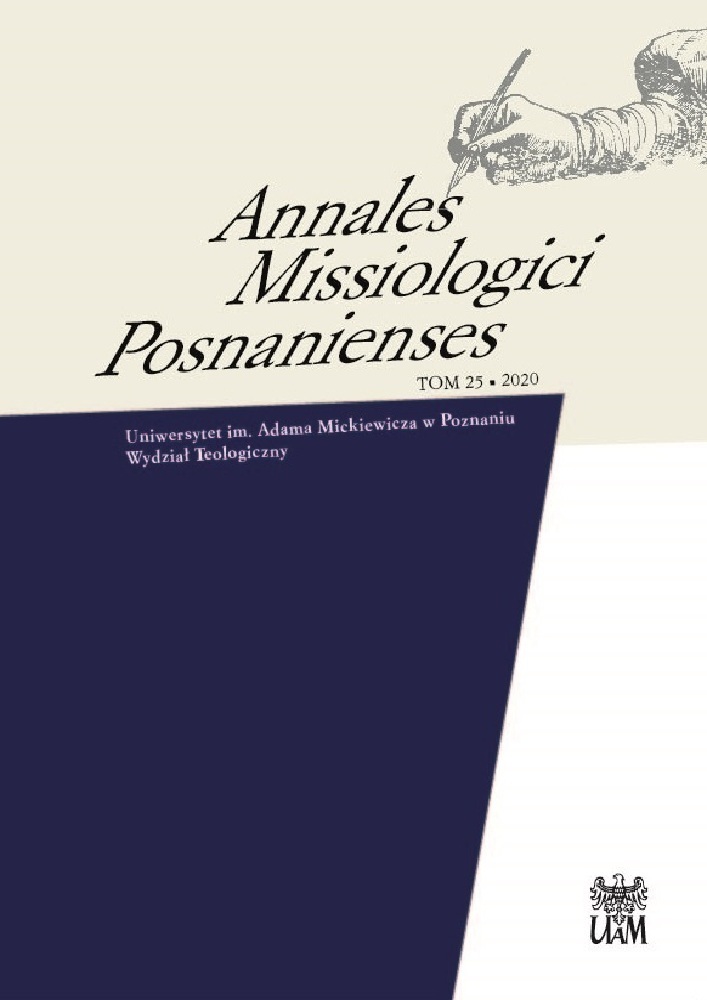Abstrakt
Media communicating via the Internet have become tools of evangelizing influence since the early 1990s. They became the subject of research for the author, in terms of how well they are known to the Internet users depending on the degree of religiosity they declared (believers and regular users, believers and occasional practitioners, non-believers), which allowed to formulate pastoral postulates and conclusions. The survey included persons from a representative, nationwide sample (N = 1000) who completed standardized CAWI (Computer-Assisted Web Interview) questionnaire interviews and VIDI (Virtual Individual In-Depth Interviews – individual indepth interviews). This is the first such extensive research on Poland. According to the research, the knowledge and use of Christian media that communicate through the Internet, including the missionary ones, changes depending on the respondents’ declared degree of religiosity.
Bibliografia
Adamski Andrzej, Łęcicki Grzegorz. „Teologia mediów i komunikacji – na styku nauk o mediach oraz nauk teologicznych.” Studia Medioznawcze (2016) 2: 11-24.
Benedykt XVI. Orędzie na 43. Światowy Dzień Śródków Społecznego Przekazu „Nowe technologie, nowe relacje. Trzeba rozpowszechniać kulturę szacunku, dialogu i przyjaźni”, 24 stycznia 2009r. Dostęp 4 października 2020. <https://www.paulus.org.pl/224,43-sdsspbenedykt-xvi-2009>
Domaszk, Arkadiusz. „Środki komunikacji społecznej w nauczaniu Kościoła i misji ewangelizacyjnej.” Seminare (2013) 1: 81-95.
Franciszek. Orędzie na 53. Światowy Dzień Śródków Społecznego Przekazu „Wszyscy tworzymy jedno” (Ef 4, 25). Od wirtualnych wspólnot społecznościowych do wspólnot ludzkich, 24 stycznia 2019 r. Dostęp 4 października 2020. <https://www.paulus.org.pl/214,53-swiatowy-dziensrodkow-spolecznego-przekazu-franciszek-2019>
Goban-Klas, Tomasz. Media i komunikowanie masowe. Teorie i analizy prasy, radia, telewizji i Internetu. Warszawa: Wydawnictwo naukowe PWN, 1999.
Hajduk, Ryszard. Apologetyka pastoralna. Duszpasterska odpowiedź Kościoła na wyzwania czasów współczesnych. Krąków: Homo Dei 2009.
Hofman, Iwona. „Paradygmaty nowej dyscypliny.” Studia Medioznawcze (2019) 4: 308–317.
Jan Paweł II. Orędzie na 24. Światowy Dzień Środków Społecznego Przekazu „Misja Kościoła w erze komputerów”, 24 stycznia 1990 r. Dostęp 4 października 2020. <https://www.paulus.org.pl/243,24-sdssp-jan-pawel-ii-1990>
Jan Paweł II. Posynodalna adhortacja apostolska Christifideles laici. Poznań: Wydawnictwo Pallottinum, 1988.
Kloch, Jozef. Internet i Kościół. Warszawa: Dom Wydawniczy Elipsa, 2011.
Kloch, Jozef. Kościół w Polsce wobec Web 2.0. Kielce: Wydawnictwo Jedność, 2013.
Konik, Roman. „Najnowsze nowe media i stare nowe media. Spor o definicję nowych mediów.” Dyskurs (2016) 2: 20-39.
Krzysztofek, Kazimierz. „Status mediów cyfrowych: stare i nowe paradygmaty.” Global Media Journal – Polish Edition (2006) 1: 1-15.
Kuciński, Mariusz. Internet w Kościele – Kościół w Internecie. Cyfrowa agora przestrzenią nowej ewangelizacji. Pelplin: Bernardinum, 2019.
Levinson, Paul. Nowe nowe media. Kraków: WAM, 2010.
Łęcicki, Grzegorz. „Kościół a media.” Media w duszpasterstwie. Red. Monika Przybysz, Tomasz Wielebski. Warszawa: Wydawnictwo UKSW 2014.
Manovich, Lev. Język nowych mediów. Warszawa: WAiP, 2006
Manovich, Lev. New Media from Borges to HTML. Cambridge, Massachusetts: MIT Press, 2003.
Mazzei, Luciano. Chiesa e comunicazione. I mass media della Santa Sede. Roma: L’erma di Bretschneider, 1997.
Nieć, Mateusz. Komunikowanie społeczne i media. Warszawa: Wolters Kluwer, 2010.
Nogowski, Jacek. „Duszpasterstwo w Polsce wobec mass mediów.” Civitas et Lex (2016) 3: 7-15.
Przybyłowski, Jan. Rola nowej ewangelizacji w Kościele i w świecie. Warszawa: Wydawnictwo UKSW, 2014.
Słownik wiedzy o mediach. Red. Edward Chudziński. Warszawa – Bielsko-Biała: Park Edukacja, 2007.
Sobór Watykański II. Konstytucja dogmatyczna o Kościele Lumen gentium. Poznań: Wydawnictwo Pallottinum, 2005.
Sobór Watykański II. Konstytucja duszpasterska o Kościele w świecie wspołczesnym Gaudium et spes. Poznań: Wydawnictwo Pallottinum, 2005.
Szpunar, Magdalena. „Czym są nowe media – próba konceptualizacji.” Studia medioznawcze (2008) 4: 31-40.
Szpunar, Magdalena. Imperializm kulturowy Internetu. Kraków: IDMiKS UJ, 2017.
Szpunar, Magdalena. W stronę nowych mediów. Toruń: Wydawnictwo Adam Marszałek, 2010.
Śniadach, Grzegorz. Parafia a w dobie Internetu. Warszawa: Dom Wydawniczy Elipsa, 2019.
Umiński, Grzegorz. Diecezjalne WWW w Polsce, a Nowa Ewangelizacja. Poszukiwania teologiczno-medioznawcze. Warszawa: Dom Wydawniczy Elipsa, 2017.
Wajs, Piotr. Media społecznościowe jako przestrzeń głoszenia Słowa Bożego. Teoria i praktyka. Warszawa: Dom Wydawniczy Elipsa, 2019.
Wielebski, Tomasz. „Teologia pastoralna i duszpasterstwo w służbie ewangelizacji.” Media w duszpasterstwie. Red. Monika Przybysz, Tomasz Wielebski. Warszawa: Wydawnictwo UKSW, 2014.
Licencja
Prawa autorskie (c) 2020 Marcin Wrzos

Utwór dostępny jest na licencji Creative Commons Uznanie autorstwa – Bez utworów zależnych 4.0 Międzynarodowe.
PRACE PUBLIKOWANE W CZASOPIŚMIE DOSTĘPNE SĄ NA LICENCJI CREATIVE COMMONS:
Przed 2006 do wszystkich tekstów opublikowanych prawa autorskie są zastrzeżone.
Autorzy
Autorzy tekstów przyjętych do publikacji w czasopiśmie Annales Missiologici Posnanienses są zobowiązani do wypełnienia, podpisania i odesłania na adres redakcji umowy o udzielenie nieodpłatnej licencji do utworów ze zobowiązaniem do udzielania sublicencji CC.
Zgodnie z umową, autorzy tekstów opublikowanych w czasopiśmie Annales Missiologici Posnanienses udzielają Uniwersytetowi im. Adama Mickiewicza w Poznaniu niewyłącznej i nieodpłatnej licencji Creative Commons Attribution-NonCommercial-NoDerivatives 4.0 International (CC BY-NC-ND 4.0) oraz zezwalają na sublicencje na tych samych warunkach.
Autorzy zachowują prawa do dalszego, swobodnego rozporządzania utworem.
Użytkownicy
Zainteresowani użytkownicy internetu uprawnieni są do korzystania z utworów opublikowanych od 2021 roku w Annales Missiologici Posnanienses pod następującymi warunkami:
- uznanie autorstwa – obowiązek podania wraz z rozpowszechnionym utworem, informacji, o autorstwie, tytule, źródle (odnośniki do oryginalnego utworu, DOI) oraz samej licencji;
- użycie niekomercyjne – nie należy wykorzystywać utworu do celów komercyjnych;
- bez tworzenia utworów zależnych – utwór musi być zachowany w oryginalnej postaci, nie można bez zgody twórcy rozpowszechniać np. tłumaczeń, opracowań.
Zainteresowani użytkownicy internetu uprawnieni są do korzystania z utworów opublikowanych w latach 2006-2020 w Annales Missiologici Posnanienses pod następującymi warunkami:
- uznanie autorstwa – obowiązek podania wraz z rozpowszechnionym utworem, informacji, o autorstwie, tytule, źródle (odnośniki do oryginalnego utworu, DOI) oraz samej licencji;
- bez tworzenia utworów zależnych – utwór musi być zachowany w oryginalnej postaci, nie można bez zgody twórcy rozpowszechniać np. tłumaczeń, opracowań.
Inne
Uniwersytet im. Adama Mickiewicza w Poznaniu zachowuje prawo do czasopisma jako całości (układ, forma graficzna, tytuł, projekt okładki, logo itp.).



